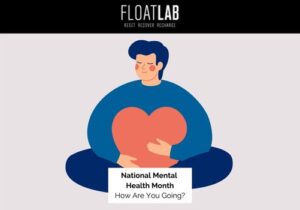October 28, 2022
National Mental Health Month – How Are You Going?

As we round out October, the National Mental Health Month, we want to know – how are you going?
This month was created to bring awareness and action to our mental health and wellbeing.
We know that 1 in 5 Australians will experience a mental health problem in any given year – depression, anxiety, burnout, and more. This means, that within the year you will be affected by mental illness in some way, possibly your own mental health, within your immediate family, close friend group, work colleagues.
This is why the 2022 theme ‘Building Resilience: Communities and Connections’ is so important.
Coordinated by the Mental health Foundation Australia, this month gives us a reason to pay a little more attention to how we can improve our mental wellbeing, and this year’s theme points the spotlight on our connection to the people and services around us that can help keep us strong.
So, we would like to offer a wellbeing support service to ease mental health burdens and encourage you to connect with your own body responses, to be aware of how you can gauge and intervene when mental health problems may arise.
A Physical Connection
Whatever happens in our mind, emotions and thoughts ripples through our body to create a physical response – as small as a frown, crying, tight fists, shoulder tension and digestive issues.
This is part of our fight-flight-freeze response, which is our sympathetic nervous system, kicking into gear to address a “threat” and send cortisol, adrenaline, blood flow into the muscles, giving us a chance to act to survive.
But the problem is, this is quite an ancient response, and our lifestyles today don’t often require a physical response to our stressors. So, this builds up in our body, causing illness and imbalance to our immune system, hormones, sleep patterns, weight loss or gain, memory and brain function, increasing inflammation and more.
The key to undoing this fight-flight-freeze response is in ‘switching off’ the sympathetic nervous system, and ‘switching on’ the parasympathetic nervous system, the one known as rest and digest.
If we consider that physical pathway linking brain to body, we have an advantage – a pathway back in, to calm and send help to our nervous system.
The Science of Floating
One 2018 study published in PLOS One found a single, one-hour sensory deprivation float session significantly reduced anxiety for people on the trial, who were living with stress and anxiety related disorders.
Float tanks offer a variety of benefits when it comes to mental health, one of those is the opportunity to practice mindfulness, a technique taught to many when suffering the ill effects of stress or mental health problems.
The high concentration of magnesium (Epsom salts) in the water also assists in relaxation and restoration and is known to calm the nervous system.
Happy hormones are released during a float, a phenomenon those who practice call the ‘post float glow’. The hormones that create a feeling of happiness are increased, while those that oppose, such as cortisol, reduce.
A flow on effect of floating is better sleep – another major factor that has a big impact on our overall health and wellbeing.
Your Pledge
As we head into a busy time of year for most of us, we encourage you to keep your mental health as one of the top items on your ‘to do’ list.
Check in with yourself often, take time to address problems before, or as they emerge.
Hold tight to those actions you know keep up your mental wellness, such as booking in a regular float session, and change your perspective on these actions – see them as a necessity, rather than something that can slip down your priority list.
Remember, the 2022 theme ‘Building Resilience: Communities and Connections’, so reach out to your support people and systems to help maintain your mental wellness.
Find out more about floatation therapy in Perth at Float Lab, with three locations in the metropolitan area.
Rest. Recover. Recharge.
